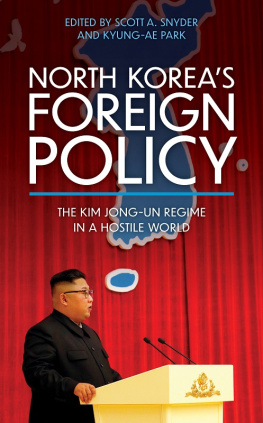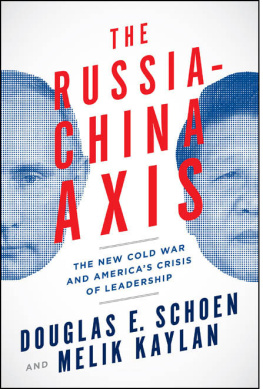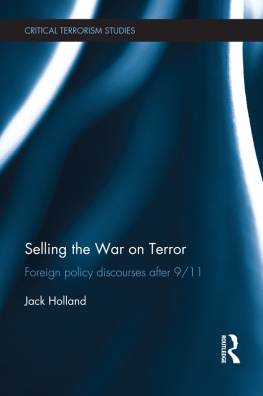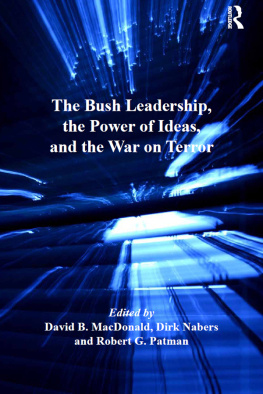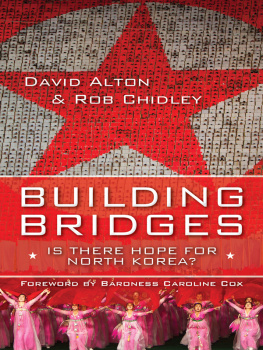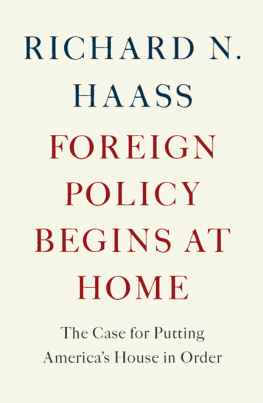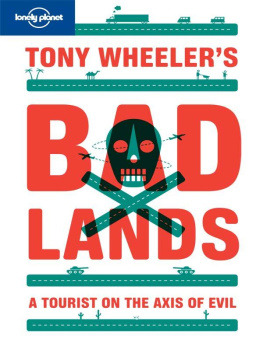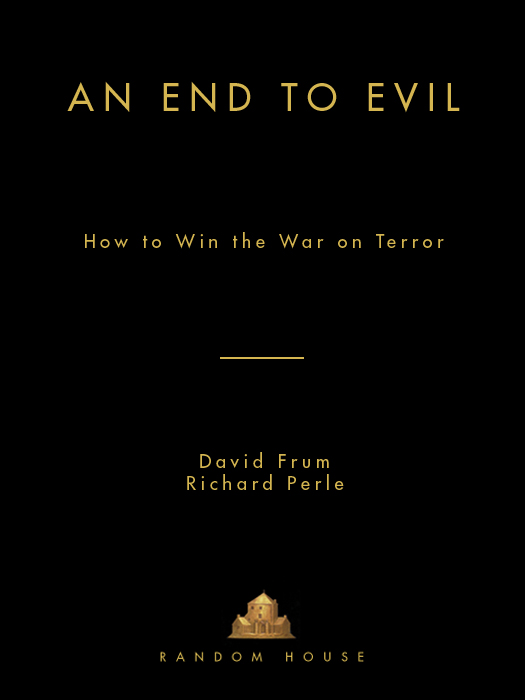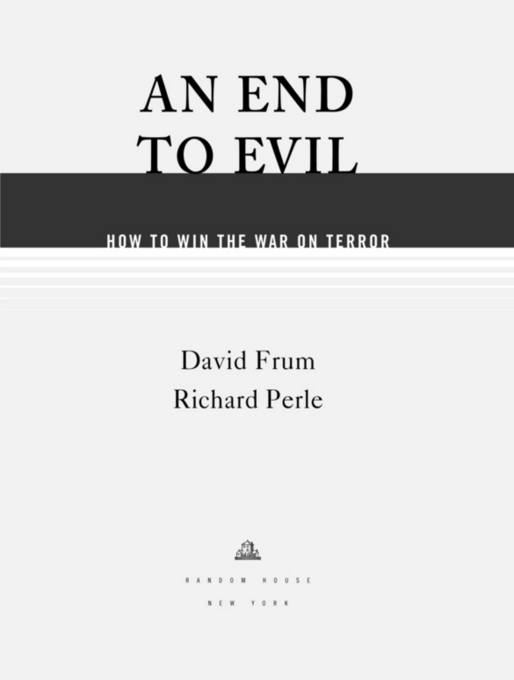ALSO BY DAVID FRUM
The Right Man: The Surprise Presidency
of George W. Bush
How We Got Here:
The 70s: The Decade That Brought You
Modern Lifefor Better or Worse
Whats Right: The New Conservative Majority
and the Remaking of America
Dead Right
ALSO BY RICHARD PERLE
Hard Line
Copyright 2003 by David Frum and Richard Perle
All rights reserved under International and Pan-American Copyright Conventions. Published in the United States by Random House, an imprint of The Random House Publishing Group, a division of Random House, Inc., New York, and simultaneously in Canada by Random House of Canada Limited, Toronto.
R ANDOM H OUSE and colophon are registered trademarks of Random House, Inc.
Library of Congress Cataloging-in-Publication is available.
Random House website address: www.atrandom.com
eISBN: 978-1-58836-360-2
v3.1
To Florence Rosberg teacher,
reader, friend, grandmother
and for ninety years an American patriot
D.F.
To the memory of my friend and
mentor Albert Wohlstetter and the many
dedicated officials and thinkers
he encouraged and inspired
R.P.
CONTENTS
1. WHAT NOW?
These are the times that try mens souls. The summer soldier and the sunshine patriot will, in this crisis, shrink from the service of their country; but he that stands it now, deserves the love and thanks of man and woman. Tyranny, like hell, is not easily conquered; yet we have this consolation with us, that the harder the conflict, the more glorious the triumph.
THOMAS PAINE, The American Crisis, 1780
W E TOO LIVE in trying timesand thus far our fellow Americans have passed every test. They have shown themselves, as President Bush said in his speech in the National Cathedral on September 14, 2001, generous and kind, resourceful and brave. They have fought and won two campaigns on the opposite side of the globe, saving millions of Afghans from famine and the nation of Iraq from tyranny. They have hunted down terrorists and killers, while respecting the rights of the innocent. And they have uncomplainingly accepted inconvenience and danger through tiresome years of lineups at airports, searches at public buildings, and exposure to further acts of terror.
Now comes the hardest test of all. The war on terror is not over. In many ways, it has barely begun. Al-Qaeda, Hezbollah, and Hamas still plot murder, and money still flows from donors worldwide to finance them. Mullahs preach jihad from the pulpits of mosques from Bengal to Brooklyn. Iran and North Korea are working frantically to develop nuclear weapons. While our enemies plot, our allies dither and carp, and much of our own government remains ominously unready for the fight. We have much to do and scant time in which to do it.
Yet at this dangerous moment many in the American political and media elite are losing their nerve for the fight. Perhaps it is the political cycle: For some Democrats, winning the war has become a less urgent priority than winning the next election. Perhaps it is the media, rediscovering its bias in favor of bad news and infecting the whole country with its own ingrown pessimism. Perhaps it is Congress, resenting the wars cost and coveting the money for its own domestic spending agendas.
Or perhaps it is just fatigue. President Bush warned Americans from the start that the war on terror would be long and difficult and expensive. But in 2001 those warnings were just words. Today they are realities. And while the American people have shouldered those realities magnificently, Americas leaders too often seem to flinch from them. Every difficulty, every casualty, every reverse seems to throw Washington, D.C., into a panicas if there had ever been a war without difficulties, without casualties, without reverses. In the war on terror, the United States has as yet suffered no defeats, except of course for 9/11 itself. But defeats may well occur, for they too are part of war, and we shudder to think how some of our leaders in their current mood will respond.
We can feel the will to win ebbing in Washington; we sense the reversion to the bad old habits of complacency and denial.
Throughout the 1990s, thousands of terrorists received training in the al-Qaeda camps of Afghanistanand our government passively monitored the situation. Terrorists attacked and murdered Americans in East Africa, in Yemen, in Saudi Arabiaand America responded to these acts of war as if they were ordinary crimes. Iraq flagrantly violated the terms of its 1991 armisticeand our government from time to time fired a cruise missile into Baghdad but otherwise did little. Iran defied the Monroe Doctrine and sponsored murder in our own hemisphere, killing eighty-six people and wounding some three hundred at a Jewish Community Center in Buenos Airesand our government did worse than nothing: It opened negotiations with the murderers. Mullahs and imams incited violence and slaughter against Christians and Jewsand our government failed to acknowledge that anything important was occurring.
September 11 is supposed to have changed all that. Since the attacks on the World Trade Center and the Pentagon, terrorism has become the first priority of our government. Or so it is saidbut is it true? The forces and the people who lulled the United States into complacency in the 1990s remain potent today, and in the wake of the victories in Afghanistan and Iraq, they are exerting themselves ever more boldly.
With a few stalwart exceptions, such as Senator Joe Lieberman, the administrations Democratic opponents seem ready to give up the fight altogether. They want to give up on Iraq. They denounce the Patriot Act. They condemn President Bushs policies (in the words of Richard Gephardt) as a miserable failure. Traveling to France in October 2003 to criticize her country, former secretary of state Madeleine Albright declared, Bush and the people under him have a foreign policy that is not good for America, not good for the world. But as to what to do instead, they say nothing, leaving the impression that they wish to do nothing.
Nor is it only the presidents political opponents who seem bereft of ideas. At the State Department, there is constant pressure to return to business as usual, beginning by placating offended allies and returning to the exaggerated multilateral conceit of the Clinton administration. Generals, diplomats, and lawmakers who retired and now work for the Saudi government or Saudi companies huff and puff at the damage the war on terror is doing to the U.S.-Saudi relationship. Members of Congress complain about the cost of fighting terror. On television, respected commentators intone about quagmires and overstretch. Leading journalists deplore Muslim and European anti-Americanism in a way that implies we are its cause.
If you ask them, many of these respectable characters will insist that they remain keen to wage war on terrorism. But press them a little, and it quickly becomes clear that they define terror very narrowly. They are eager to arrest the misfits and thugs who plant bombs and carry guns. But as for the larger networks that recruit the misfits and thugs, as for the wealthy donors who pay the terrorists bills, as for the governments that give terrorists aid and sanctuary, as for the larger culture of incitement and hatred that justifies and supports terror: All of that they wish to leave alone. As the inevitable disappointments and difficulties of war accumulate, as weariness with wars costs and rigors spreads, as memories of 9/11 fade, the advocates of a weaker line against terror have pressed their timid case. Like rust and mildew, they make the most progress when they receive the least attention, for their desired policy coincides with the natural predilections of government.


